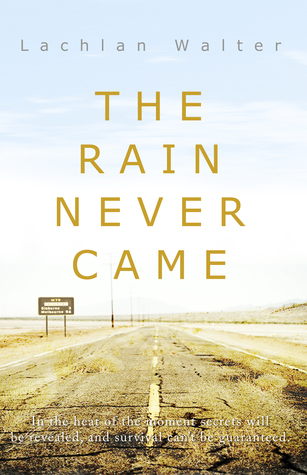
The Rain Never Came
Author: Lachlan Walter
Publication date: 25 May 2017
Publisher: Odyssey Books
Reviewer: Meghan Brewster
The Rain Never Came is the debut novel by Australian writer and critic, Lachlan Walter. Having previously published science fiction reviews, Walter has turned his interest in post-apocalyptic fiction and Australian identity into a new book.
Set in the writer’s hometown, The Rain Never Came explores community in the imaginable future at a time of unending drought. Towns have been broken apart by forced evacuations and hardship. A stubborn few have resisted the forced removal and hide out in small country towns, where no one would bother looking. Bill Cook and Tobe Cousins, united by tragedy, are two of those people.
Walter was inspired by the real life drought that had fallen upon his town, stating in an interview, “communities were fraying as those who depended on water for their livelihood began walking off their farms, abandoning the land and moving to the city; water theft had become a common occurrence; our 20th-century technology meant nothing against nature. It seemed as if the past had returned; a world of hard work, dust and thirst.”
Bill, who lives within a fractured community, tells this story in the first person. He is joined by a long-time friend, Tobe, who returns to town with stories of beyond. When lights can be seen one night in the distance, the friends set off to investigate.
However, the beginning is slow. It is not until a 3rd of the way into the story that the friends actually set off from the town and enter the outside world. It isn’t until this point, once they are beyond their town, that I am really intrigued. I won’t tell you what exactly happens, but I will tell you it was hard to get here. I often reread paragraphs to find any details I thought I had missed. Dialogue is abundant, as are descriptions of smoking, toileting and the behaviour of dogs.
There’s little to orientate the reader as to both the exact surroundings of the characters as well as their motivations. Bill seems to have no real clue why he is following Tobe, and Tobe isn’t clear why he wants Bill to come. “Look, you know I need you out here. I need you watching me back. But it has to be your choice, mate.” This statement would make more sense if Tobe did not travel back and forth from these abandoned communities without Bill for years. This “need” for Bill remains abstract.
The concept is relevant and realistic; drought, a lack of water and survival in a sunburnt landscape. But for a book about rain never coming, there doesn’t seem to be any urgency, plan or interest in water. They do not act like people without water. They play football matches in the mid-day heat; they drink to the point of blacking out and then struggle through hangovers. They trudge across the landscape under the sun, marching into the distance without taking stock and measuring out their water. They do not even seem to look for more water or attempt to solve the water crisis. For people on the brink of death, they mostly just hang out.
There was a wonderful idea, and excellent source material that was not completely explored. This is an Australian Cli-Fi novel seemingly aimed at a male audience. Promoted as a science fiction western, it felt more western than science fiction, which left me reading out of my preferred genre.
The slang vocabulary, and the detail with which drinking and pissing is described lends itself towards a more masculine reader. That’s not to say women won’t read it, but I imagine they’d have more issues with young girls being punched in the face and treated with the same regard as a dead animal.
She drank and drank, oblivious to everything else. She finished the canteen, looked up at us, her eyes sad and hollow. Please, they seemed to say, may I have some more?
“Good man,” Tobe said as I lowered my rifle.
And then he threw the other canteen to her. As she fumbled to catch it, he walked over and punched her in the face.
The Rain Never Came just didn’t go deep enough into what it would mean to survive in such a place. The characters didn’t have any huge talent or redeeming features or work ethic to make their lives functional. I wanted to read about people fighting to survive and attempting to create a life under such environmental adversity, but it wasn’t there.
Readers who enjoy sweeping deserted post-apocalyptic landscapes like those found in Mad Max, as well as fans of Hugh Howey’s novels, particularly Sand, will really enjoy this book. But I didn’t find what I was hoping for here.
